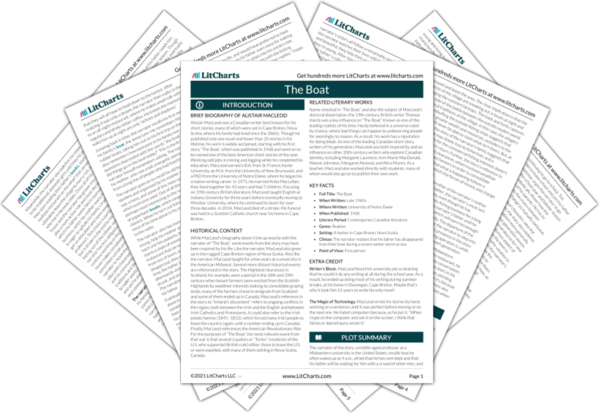As the titular object of the story, the boat (aka the Jenny Lynn) is key to understanding everything that happens to the narrator and his family. Perhaps above all, the boat represents tradition. On the surface level, the name of the boat is significant because it follows the naming pattern that everyone in this particular fishing village uses (basing the boat’s name on that of a female family member), illustrating one of the many ways that the local community is bound together by traditions. The specific name of the narrator’s family’s boat, Jenny Lynn, is also significant: it links the boat specifically to the narrator’s mother, who is described as being “of the sea” and is more devoted to the traditions of their tight-knit fishing community than any other character in the story. Because it shares the mother’s maiden name, rather than her current one, the boat also evokes the past and ancestors, showing how the weight of the familial line persists into the present day, and in particular how the mother feels that it is her duty to preserve the fishing traditions of her family.
While this connection to the past is important, the boat also plays a central role in the present lives of the narrator and his family: because they depend on their fishing catch for their entire income, The boat is the key to their livelihood. It is the economic anchor of the family—when the narrator’s uncle decides to work on a larger vessel in order to make enough money to buy his own boat, the implication is that he is leaving the orbit of the narrator’s family in order to start his own family. The boat makes the family. The family, in some sense, is the boat: preserving relationships and tradition through the current of time into the future.
As the story progresses, the boat becomes a source of both of unity and division in the narrator’s family. During the final summer season, when the work is easy and profitable, the narrator becomes closer with his father, to his mother’s approving delight. But just a few months earlier, when it was necessary to prepare the boat for the lobster season, the boat led to family conflict: because his father is ill, the narrator chooses to leave school to help with the preparations (pleasing his mother), but his father tells him he must return to school. IN this way the story dramatizes how the boat, and the old traditions it represents, prevents the narrator from achieving his potential at school, where he is exposed to new learning, to new ideas. And the narrator’s mother and father’s different opinions about the narrator’s priorities—whether or not he should leave school to work on the boat—represent their broader feelings about the traditions the boat represents. The narrator’s mother thinks they are all that matters, while his father thinks they are restrictive and thwart personal dreams. Ultimately, the boat leads to the death of the narrator’s father: while the circumstances are ambiguous, it seems likely that the narrator’s father committed suicide so that his son would not be anchored to the boat—to tradition—in the same way that he was.
The Boat Quotes in The Boat
There are times even now, when I awake at four o’clock in the morning with the terrible fear that I have overslept; when I imagine that my father is waiting for me in the room below the darkened stairs or that the shorebound men are tossing pebbles against my window while blowing their hands and stomping their feet impatiently on the frozen steadfast earth.
When we returned to the house everyone made a great fuss over my precocious excursion and asked, “How did you like the boat?” “Were you afraid in the boat?” “Did you cry in the boat?” They repeated “the boat” at the end of all their questions and I knew it must be very important to everyone.
She was thirty-two feet long and nine wide, and was powered by an engine from a Chevrolet truck. She had a marine clutch and a high-speed reverse gear and was painted light green with the name Jenny Lynn stencilled in black letters on her bow and painted on an oblong plate across her stern. Jenny Lynn had been my mother’s maiden name and the boat was called after her as another link in the chain of tradition. Most of the boats that berthed at the wharf bore the names of some female member of their owner’s household.
And the spring wore on and the summer came and school ended in the third week of June and the lobster season on July first and I wished that the two things I loved so dearly did not exclude each other in a manner that was so blunt and too clear.
On November twenty-first the waves of the grey Atlantic are very high and the waters are very cold and there are no sign posts on the surface of the sea. You cannot tell where you have been five minutes before and in the squalls of snow you cannot see. And it takes longer than you would believe to check a boat that has been running before a gale and turn her ever so care fully in a wide and stupid circle, with timbers creaking and straining, back into the face of storm. And you know that it is useless and that your voice does not carry the length of the boat and that even if you knew the original spot, the relentless waves would carry such a burden perhaps a mile or so by the time you could return. And you know also, the final irony, that your father, like your uncles and all the men that form your past, cannot swim a stroke.

















